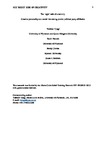The ‘Right’ Side of Creativity: Creative Personality and Social Risk-Taking Predict Political Party Affiliation
| dc.contributor.author | Tyagi, V | |
| dc.contributor.author | Hanoch, Yaniv | |
| dc.contributor.author | Choma, B | |
| dc.contributor.author | denham, susan | |
| dc.date.accessioned | 2019-03-28T13:29:15Z | |
| dc.date.available | 2019-03-28T13:29:15Z | |
| dc.date.issued | 2018-11-10 | |
| dc.identifier.issn | 1040-0419 | |
| dc.identifier.issn | 1532-6934 | |
| dc.identifier.uri | http://hdl.handle.net/10026.1/13566 | |
| dc.description.abstract |
Factors that predict political party affiliation are of particular importance in research due to the wider implications in politics and policy making. Extending this line of work, the idea that creativity predicts party affiliation was tested using 2 conceptualizations of creativity: creative personality and creative ideation. Participants (N = 406) based in the United States completed measures of creativity, socio-political attitudes, and domain specific risk-taking, and indicated their party affiliation. Results revealed a significant link between creative personality and political party affiliation. Furthermore, in addition to the socio-political attitudes, this link was explained, in part, by individuals’ social risk-taking. Specifically, individuals with higher scores on creative personality were more likely to affiliate to the Democratic party, whereas the reverse was true for affiliation to the Republican party. This article provides new insights into factors that predict political party affiliation and presents wider social implications of the findings. | |
| dc.format.extent | 1-10 | |
| dc.language | en | |
| dc.language.iso | en | |
| dc.publisher | Informa UK Limited | |
| dc.subject | Prevention | |
| dc.subject | Behavioral and Social Science | |
| dc.subject | Clinical Research | |
| dc.title | The ‘Right’ Side of Creativity: Creative Personality and Social Risk-Taking Predict Political Party Affiliation | |
| dc.type | journal-article | |
| dc.type | Journal Article | |
| plymouth.author-url | https://www.webofscience.com/api/gateway?GWVersion=2&SrcApp=PARTNER_APP&SrcAuth=LinksAMR&KeyUT=WOS:000453358000013&DestLinkType=FullRecord&DestApp=ALL_WOS&UsrCustomerID=11bb513d99f797142bcfeffcc58ea008 | |
| plymouth.issue | 4 | |
| plymouth.volume | 30 | |
| plymouth.publication-status | Published online | |
| plymouth.journal | Creativity Research Journal | |
| dc.identifier.doi | 10.1080/10400419.2018.1540252 | |
| plymouth.organisational-group | /Plymouth | |
| plymouth.organisational-group | /Plymouth/REF 2021 Researchers by UoA | |
| plymouth.organisational-group | /Plymouth/REF 2021 Researchers by UoA/UoA04 Psychology, Psychiatry and Neuroscience | |
| plymouth.organisational-group | /Plymouth/Research Groups | |
| plymouth.organisational-group | /Plymouth/Research Groups/Centre for Brain, Cognition and Behaviour (CBCB) | |
| plymouth.organisational-group | /Plymouth/Research Groups/Centre for Brain, Cognition and Behaviour (CBCB)/Behaviour | |
| plymouth.organisational-group | /Plymouth/Research Groups/Centre for Brain, Cognition and Behaviour (CBCB)/Brain | |
| dcterms.dateAccepted | 2018-01-01 | |
| dc.rights.embargodate | 2022-1-25 | |
| dc.identifier.eissn | 1532-6934 | |
| dc.rights.embargoperiod | Not known | |
| rioxxterms.versionofrecord | 10.1080/10400419.2018.1540252 | |
| rioxxterms.licenseref.uri | http://www.rioxx.net/licenses/all-rights-reserved | |
| rioxxterms.licenseref.startdate | 2018-11-10 | |
| rioxxterms.type | Journal Article/Review |


